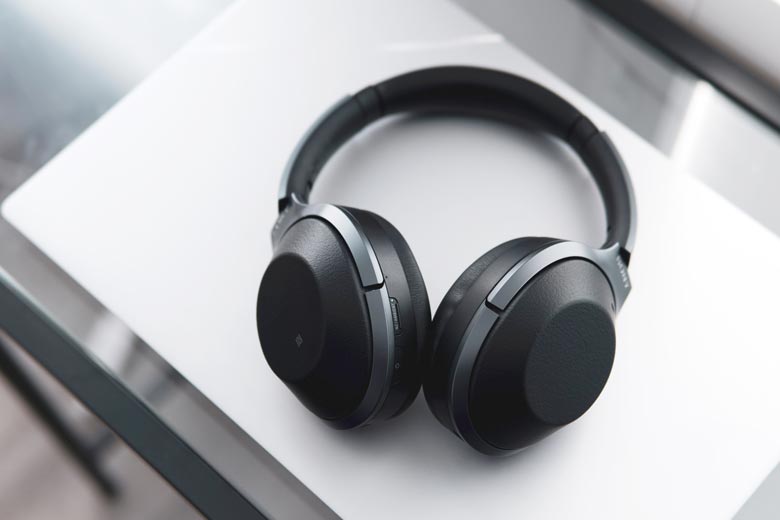If you have tinnitus, wearing headphones may bring about a lot of frustrations. However, if you take the right measures, this doesn’t have to be the case.
You can wear headphones if you have tinnitus, as long as you keep them at a safe volume. Wearing noise-canceling headphones or headphones with great sound quality can help shift your attention away from the ringing.
Tinnitus can be irritating in everyday life, which leads people to wonder if it’s an impairment for wearing headphones. This article will give better insight into how headphones could worsen tinnitus and how to safely use headphones when you have tinnitus.

Why It’s Safe to Wear Headphones if You Have Tinnitus
The American Tinnitus Association recommends that patients avoid listening to loud music through earbuds or headphones. But when listening to music at a safe volume, wearing headphones can be okay.
If your headphones don’t allow sound to leak out, you shouldn’t need to turn the volume up very high. That means you’re unlikely to make your tinnitus any worse by wearing them.
You can make it even safer by remembering two important tips:
- Make sure that your headphones are a good fit. For example, try over-the-ear or in-ear headphones instead of earbuds. A good fit can help prevent sound from leaking from your headphones and make your tinnitus louder.
- Don’t listen at too high a volume for too long. Your risk suffering from of hearing loss increases when you listen to loud music over long periods. The risk of worsening your tinnitus also increases.
How Headphones Affect Tinnitus
Headphones can emit sound at a much higher volume than the human ear can tolerate. This can result in permanent hearing damage and tinnitus, a ringing or buzzing sound in the ears even when no external noise is present.
According to the American Tinnitus Association, 50 million Americans suffer from some degree of tinnitus, and 12 million Americans are severely impaired by it.
Headphones—especially cheap ones—don’t do your ears any justice either. It has been shown that those who listen to music at 85 decibels (dB) or more for long periods have a higher chance of suffering from permanent hearing loss and tinnitus.
What Is the Best Way To Listen to Music With Tinnitus?
The best way to listen to music with tinnitus is to set your volume control to the lowest level that still lets you enjoy the music, and then start increasing it in small increments if you need to. When your tinnitus gets louder or more frequent, decrease the volume again.
Some people like to turn down the bass because it has a higher impact on their tinnitus when compared to louder treble sounds. However, it might be the other way around for you.
The idea is to balance good sound quality and comfort when listening to higher volumes.

You can use headphones or earphones instead of speakers so you can precisely control the loudness levels you are exposed to. This way, you can maximize sound quality without exposing yourself to damaging volumes.
If you have trouble hearing music with headphones or earphones, consider using hearing aids instead.
The critical thing is to make sure that the sound level of your music does not cause additional damage to your hearing.
How Can I Protect My Ears While Using Headphones?
The last thing you need when listening to music through headphones is permanent hearing loss. This can be caused by listening to loud music for extended periods or using the wrong type of headphones.
Here are ways of protecting your ears when listening to headphones:
Choose the Right Headphones
Headphones that sit on top of your ears and cover the ears are considerably safer than earbuds.
If you can, choose to go with over-ear or on-ear headphones. Usually, these types of headphones also have the advantage of giving you a better sound quality.
Moderate Noise Levels
Generally, the louder the volume, the shorter the safe listening time, so adjust your volume as necessary to avoid raising the risk of hearing damage. You’ll also want to avoid listening to music with loud background noises—this may force you to turn up the volume just so you can hear the music.
The first thing to do is to ask yourself whether the sound from your tinnitus is worse when you’re using headphones. For example, if you have earphones on and listen to music at high volumes for a long time, does your tinnitus get louder? Or does it stay about the same?
If it gets louder when you use headphones, it’s probably better not to use them as much. Instead, try just using them for short periods at lower volumes.
If the sound from your tinnitus doesn’t seem to get any louder while using headphones or earphones, then it should be fine to continue using them at whatever volume or frequency seems comfortable to you.
Make sure to never exceed 85dB, which is the limit for safe listening.
How To Find the Right Headphones if You Have Tinnitus?
Some things are just worth the money. Headphones that block outside noises, have better sound quality, or help you get a good night’s sleep are among them.
To find the right headphones if you have tinnitus, look for models with noise-canceling or noise isolation. This will help you avoid raising the volume. Good sound quality will mask the ringing in your ears and help you focus on the music.
If you have tinnitus, here are some things you should consider when choosing a pair of headphones:
Sound Quality
If you’re going to use a pair of headphones as part of your tinnitus treatment, then they must have excellent sound quality. If not, then you may end up experiencing more hearing loss instead of lessening it.
Even if your tinnitus isn’t related to hearing loss, having headphones with excellent sound quality will help you shift your attention away from the ringing.
Noise Canceling Headphones
Noise-canceling headphones are ideal for people with tinnitus, as they don’t need to be turned up as loud as traditional headphones to block out background noise. Noise-induced hearing loss can aggravate tinnitus and lead to more severe conditions.

They won’t cure your condition, but they can help mask the ringing in your ears by blocking out other sounds.
There are plenty of great over-ear and in-ear models available for every budget.
Closed-back headphones are designed to keep sound in, and usually do an excellent job of keeping ambient noise out. This means you can turn down the volume and still enjoy your music, podcasts, or audiobooks without being disturbed by background noise.
Sleep Headphones
Sleep headphones can provide the sound you need to drown out the world’s distractions, including ringing in your ears.
You can use them to play recordings designed to help you sleep. Many recordings use binaural beats or other sound therapy to help with everything from relaxation and stress relief to better sleep and more creative thinking.
Also Read: Should You Sleep With Headphones While Charging?
Conclusion
If you have tinnitus, wearing headphones shouldn’t be a big deal—that is, if you’re using them at safe volumes. However, earbud and headphone safety is not something to be taken lightly.
There are a few guidelines you should follow if you have tinnitus or are just want to limit your risk of developing it in the first place.
If you have to use headphones, be sure not to turn the volume up too high. You also want to keep track of how long you wear them. If you do need to use them for extended periods, purchase noise-canceling headphones.
